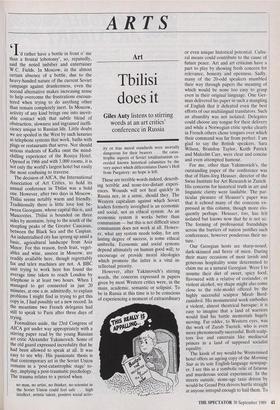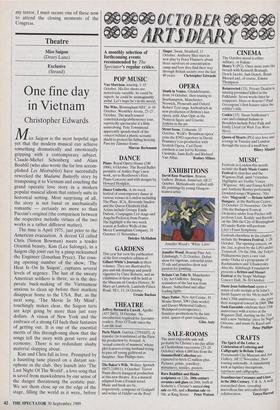ARTS
Art
Tbilisi does it
Giles Auty listens to stirring words at an art critics' conference in Russia
I'd rather have a bottle in front o' me than a frontal lobotomy', so, reputedly, said the noted imbiber and entertainer W.C. Fields. In Moscow, in the almost certain absence of a bottle, due to the heavy-handed nature of the current Soviet campaign against drunkenness, even the second alternative makes increasing sense to help overcome the frustrations encoun- tered when trying to do anything other than remain completely inert. In Moscow, activity of any kind brings one into inevit- able contact with that subtle blend of obstruction, slowness and ingrained ineffi- ciency unique to Russian life. Little doubt we are spoiled in the West by such luxuries as telephone systems that work, baths with plugs or restaurants that serve. Nor should serious students of Kafka omit the mind- chilling experience of the Rossya Hotel. Opened in 1966 and with 3,000 rooms, it is not only the world's largest hotel but easily the most confusing to traverse.
The decision of AICA, the International Association of Art Critics, to hold its annual conference in Tbilisi was a bold one. However, after two days in Moscow, Tbilisi seems notably warm and friendly. Traditionally there is little love lost be- tween Georgians, whose capital this is, and Muscovites. Tbilisi is bounded on three sides by montains, lying to the south of the steepling peaks of the Greater Caucasus, between the Black Sea and the Caspian. An industrialised city has sprung up amid a basic, agricultural landscape from Asia Minor. For this reason, fresh fruit, veget- ables and wine, unseen in Moscow, are readily available here, though regrettably fax and telex machines are not. A BBC unit trying to work here has found the average time taken to reach London by telephone is at least two hours. When I managed to get connected in just 20 minutes, at one a.m. admittedly, to explain problems I might find in trying to get this copy in, I had possibly set a new record. In the meantime two French delegates had still to speak to Paris after three days of trying.
Formalities aside, the 23rd Congress of AICA got under way appropriately with a stirring paper read by the young Russian art critic Alexander Yakimovich. Some of the old guard expressed incredulity that he had been allowed to speak at all. It was easy to see why. His passionate thesis is that contemporary art in the Soviet Union remains in a 'post-catastrophic stage' to- day, implying a post-traumatic psychology. The trauma relates to a period when
no man, no artist, no thinker, no scientist in the Soviet Union could feel safe . . . high intellect, artistic talent, positive social activ- ity or true moral standards were mortally dangerous for their bearers . . . the catas- trophic aspects of Soviet totalitarianism ex- ceeded known historical calamities by the very aspect which differentiates Dante's Hell from Purgatory: no hope is left.
These are terrible words indeed, describ- ing terrible and none-too-distant experi- ences. Wounds will not heal quickly in Russia nor, in a sense, should they. The Western capitalism against which Soviet leaders formerly inveighed is an economic and social, not an ethical system. As an economic system it works better than communism — but this is not difficult since communism does not work at all. Howev- er, what any system needs today, for any lasting degree of success, is some ethical umbrella. Economic and social systems depend ultimately on human good will; to encourage or provide moral ideologies which promote the latter is a vital in- tellectual priority.
However, after Yakimovich's stirring words, the concerns expressed in papers given by most Western critics were, in the main, academic, semantic or solipsist. To be in Russia at this time is to be conscious of experiencing a moment of extraordinary or even unique historical potential. Cultu- ral means could contribute to the cause of future peace. Art and art criticism have a part to play by showing fresh concern for relevance, honesty and openness. Sadly, many of the 20-odd speakers mumbled their way through papers the meaning of which would be none too easy to grasp even in their original language. One Ger- man delivered his paper in such a mangling of English that it defeated even the best efforts of our multilingual translators. Such an absurdity was not isolated. Delegates could choose any tongue for their delivery and while a Norwegian critic spoke clearly in French others chose tongues over which their command was far from perfect. I am glad to say the British speakers, Sara Wilson, Brandon Taylor, Keith Patrick and Malcolm Carr, were clear and concise and even attempted humour.
For me, other than Yakimovich's, the outstanding paper of the conference was that of Hans-Jorg Heusser, director of the Swiss Institute for Art Research in Zurich. His concerns for historical truth in art and linguistic clarity were laudable. The par- ticular pleasure of Heusser's paper was that it echoed many of the concerns ex- pressed in this column, though more elo- quently perhaps. Heusser, too, has felt isolated but knows now that he is not so. The forming of professional friendships across the barriers of nation justifies such conferences, however ponderous their na- ture.
Our Georgian hosts are sharp-nosed, dark-skinned and fierce of mien. During their many occasions of most lavish and generous hospitality some determined to claim me as a natural Georgian. Were Ito assume their diet of sweet, spicy food, flavoured with a relative of coriander, or violent alcohol, my shape might also come close to the role-model offered by the highly successful sculptor Mirab Berd- zanishvil. His monumental work embodies a violent, almost theatrical baroque; it is easy to imagine that a land of warriors would find his battle memorials hugely moving. Far odder, to Western eyes, was the work of Zurab Tserteli, who is even more phenomenally successful. Both sculp- tors live and entertain like mediaeval princes in a land of supposed socialist equality. The kiosk of my would-be Westernised hotel offers an ageing copy of the Morning Star as its sole English-language newspap- er. I see this as a symbolic relic of fatuous and murderous social experiment. In the streets outside, stone-age taxis driven by would-be Grand Prix drivers hurtle straight at anyone intrepid enough to hail them. To my terror, I must secure one of these now to attend the closing moments of the Congress.



























































 Previous page
Previous page